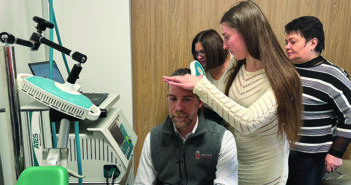Why are more people getting kidney stones?
Simone Thavaseelan RES’10 F’11, MD, is an associate professor of surgery (urology), clinician
educator, at the Warren Alpert Medical School, the section chief of urology at the Providence VA
Medical Center, and the residency program director at Rhode Island Hospital. A specialist in
endourology, she took on this question that’s affecting more and more of her patients.
Kidney stones affect one out of 11 people, and those numbers are going up, perhaps due to an unexpected culprit: climate change. Warmer weather makes people more susceptible to dehydration; this decreases urine output and concentrates calcium, oxalate, and uric acid, which contribute to kidney stone formation. As temperatures rise, researchers have noted an uptick in the rates of nephrolithiasis procedures.
Patients with stones smaller than 5 millimeters in diameter may not need surgery, though they are likely to require pain relievers. A medication such as tamsulosin can help speed passage. Larger stones usually require a procedure to break up or remove them. These include minimally invasive techniques like shockwave lithotripsy, which uses soundwaves to cause fragmentation of stones; or ureteroscopy, in which a urologist uses a thin laser fiber to fragment the stone. Very large and complex stone disease may require percutaneous nephrolithotomy, which removes stones through a small incision and often requires a short hospitalization.
The cornerstone of prevention for kidney stones is water intake, especially on hot days. Obesity and diet also may play roles in susceptibility. To reduce risk of recurrence, patients should aim to drink 80 ounces of water per day, with a goal of making two liters of urine; maintain a low-sodium diet; limit oxalate-rich foods like spinach, chocolate, and tea; and consume a moderate amount of calcium and plenty of fruits and vegetables. Recurrent or high-risk stone formers can be evaluated with additional testing, such as 24-hour urine collection, to make individualized recommendations.




